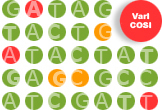|
VarI
community
of
special
interest
|
|
|
What: Variant Interpretation Session ISMB/ECCB Conference 2019
When: 10:15 AM - 6:00 PM, July 24th, 2019
Where: Room Montreal (2nd Floor), Congress Center, Basel (Switzerland).
Session 1
|
|
10:15 - 10:20 |
Welcome from the committee |
10:20 - 11:00 |
Invited Speaker:
Laura Furlong.
Hospital del Mar Medical Research Institute, Barcelona (Spain).
|
11:00 - 11:20 |
James Stephenson. ENBL-EBI, Hinxton, (United Kingdom). |
11:20 - 11:40 |
Lambert Moyon. Ecole Normale Superieure, Paris (France).
|
11:40 - 12:00 |
Alexander Gress. Helmholtz Centre for Infection Research, Saarbrucken (Germany).
|
12:00 - 12:20 |
Alexandre Renaux. Universite Libre de Bruxelles, Bruxelles (Belgium).
|
12:20 - 12:30 |
Jun Cheng. Technical University of Munich, Munich (Germany).
|
12:30 - 12:40 |
Saikat Banerjee. Max Planck Institute for Biophysical Chemistry, Gottingen (Germany).
|
|
|
Session 2
|
|
14:05 - 14:45 |
Invited Speaker:
Janet Kelso.
Max Planck Institute for Evolutionary Anthropology, Leipzig (Germany).
|
14:45 - 15:05 |
Shaojie Zhang. University of Central Florida, Orlando (FL).
|
15:05 - 15:25 |
Daniel Carlin. University of California, San Diego (CA). |
15:25 - 15:45 |
Erwin Frise Fabric Genomics, Oakland (CA).
|
15:45 - 16:00 |
Company Presentation:
Alexander Kaplun - Variantyx.
|
|
|
16:40 - 17:20 |
Invited Speaker:
Iuliana Ionita-Laza. Columbia University, New York (NY). |
17:20 - 17:40 |
Alexander Schoenhuth. Centrum Wiskunde en Informatica, Amsterdam (Netherland).
|
17:40 - 17:50 |
Andrea Castro. University of California, San Diego (CA).
|
17:50 - 18:00 |
Michal Sadowski. University of Warsaw, Warsaw (Poland).
|
18:00 - 18:05 |
Closing remarks from the committee. |
